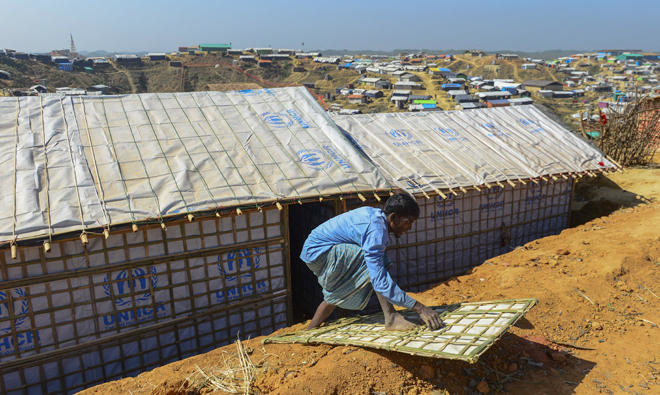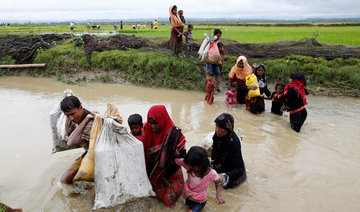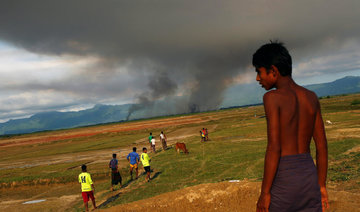DHAKA: Rohingya refugees are still arriving in Bangladesh as violence forces them to leave Myanmar, according to a report released over the weekend.
“This week, Rohingya refugees were still arriving in Cox’s Bazar, Bangladesh — the New Year bringing no end to the reports of violence and fears, which forced them to flee their homes in Myanmar,” said the report by the International Organization for Migration (IOM).
“Over 2,400 refugees are estimated to have arrived in Bangladesh during December 2017, with more people continuing to arrive each day as 2018 begins,” the report said.
Rohingya refugees from the Arakan state of Myanmar continue to enter Bangladesh while authorities of both countries discuss the process of refugee repatriation starting this month.
In the first week of January, about 60 Rohingya refugees entered Bangladesh through the Teknaf border in Cox’s Bazar district, as confirmed by local Union Parishad chairman Noor Hossain. The refugees narrated the ongoing atrocities by the Myanmar army in Rakhine.
“We were encircled by the army for the past few months. We could not even go to the jungle to collect firewood. There is an acute crisis of food,” said Farida Begum, 29, who lived in the Buthidhang area under Rakhine state of Myanmar. Farida, along with her three children, reached Bangladesh four days ago and took shelter at Tengkhali camp in Ukhia, Cox’s Bazar.
“My brother-in-law and two cousins were shot dead by the army during the first week of September. Still I tried to stay there. But these days food is scarce in my locality and that compelled me to cross the border,” Farida said.
Despite the ongoing atrocities in Rakhine, Bangladesh and Myanmar are now working on Rohingya refugee repatriation. The Joint Working Group (JWG) formed according to the deal signed on Nov. 23 last year for the repatriation of refugees, is expected to meet by mid January in Myanmar’s capital Naypyidaw, according to foreign ministry sources in Dhaka. The agreement demanded repatriation to begin within two months of signing the deal. But analysts express reservations over the success of the JWG meeting.
“Are the Rohingyas comfortable with the idea of repatriation amidst the ongoing violence?” the former Bangladeshi ambassador to the United States, Humayun Kabir, told Arab News.
Citing the three important players — the government, army and the Buddhist community of Myanmar — he says the “political government of the country needs to take the initiative and create a friendly environment so that the Rohingyas feel confident going back to their place,” he said. “The repatriation should be voluntary. Under the current circumstances, I don’t feel that they will be comfortable to go back voluntarily.”
Professor Akmol Hossain, who teaches International Relations at Dhaka University, said: “The Rohingya need to see that a favorable and welcoming situation prevails in Rakhine. Bangladesh has faced the Rohingya refugee crisis earlier as well and it took a long time to repatriate them.”
“After signing the agreement, repatriation becomes a bilateral issue for Bangladesh but we simultaneously need continuous international support,” Professor Akmol said. “We need to sensitize the Organization of Islamic Cooperation [OIC] leaders to make more diplomatic efforts. At the outset of the refugee crisis, the Bangladesh government had drawn very good international attention through its diplomatic efforts, which recently seems to have dimmed. We need to build pressure on Myanmar government through effective diplomacy.”
According to IOM, as of Jan. 7 a total of 655,000 Rohingya refugees had taken shelter in Bangladesh since the violence escalated in late August last year. The international migration agency fears a continuation of violence against Rohingyas in the new year, which has compelled them to leave the Myanmar and live an austere life in Bangladesh’s refugee camps.
Olga Rodbello, mental health and psycho-social support coordinator for IOM in Cox’s Bazar, said, “We continue to see a great deal of distress among Rohingya survivors arriving in Bangladesh. They have faced a lot of adversity and many are in need of psycho-social support to help restore a sense of safety and further strengthen the resilience they’ve already shown.”
Violence forces more Rohingya to flee to Bangladesh
Violence forces more Rohingya to flee to Bangladesh

South Korea to release preliminary report of Jeju Air crash by Monday

- One area under investigation is what role a bird strike played in the Dec. 29 crash of flight 7C2216
- It will take several months to analyze and verify flight data and cockpit voice recordings
One area under investigation is what role a bird strike played in the Dec. 29 crash of flight 7C2216 as it arrived at Muan International Airport from Bangkok, according to a ministry statement.
The report will be sent to the International Civil Aviation Organization as well as the United States, France and Thailand, the ministry said. Seoul has been cooperating with investigators from the US National Transportation Safety Board and France’s Bureau of Enquiry and Analysis for Civil Aviation Safety.
It will take several months to analyze and verify flight data and cockpit voice recordings, which stopped recording four minutes and seven seconds before the crash, and communication recordings with the control tower, the ministry said.
At 08:58:11 a.m., the pilots discussed birds flying under the Boeing 737-800, then declared mayday at 08:58:56, reporting a bird strike while the plane was on a go-around, the statement said. Airport CCTV footage also showed the plane making “contact” with birds during the go-around, it said.
Previously the ministry had said the pilots issued the distress signal due to bird strikes before going around.
The jet crashed at 9:02:57 a.m., slamming into an embankment and bursting into flames that killed everyone aboard except for two crew members in the tail section.
The surveillance footage was taken from too far away to see if there was a spark from the bird strike but it “confirmed the plane making contact with birds, though the exact time is unclear,” a ministry official told Reuters.
Duck feathers and blood were found in both of the plane’s GE Aerospace engines, the ministry said.
The ministry said it would conduct a separate analysis of the role of the concrete embankment that supported navigation antennas called “localizers.” The ministry said on Wednesday that it would remove the embankment, which experts said likely made the disaster more deadly.
India probes mystery illness after 17 die: reports

SRINAGAR: Authorities in India-administered Jammu and Kashmir were investigating a mysterious disease that has claimed the lives of 17 people, local media reports said Saturday.
The deaths, including those of 13 children, have occurred in the remote village of Badhaal in Jammu’s Rajouri area since early December.
The village was declared a containment zone earlier this week with around 230 people quarantined, the Press Trust of India (PTI) news agency reported.
All of the fatalities had damage to the brain and nervous system, Amarjeet Singh Bhatia, who heads Rajouri’s government medical college, said.
“The winter vacations have also been canceled to deal with the medical alert situation,” PTI quoted Bhatia as saying.
The victims were members of three related families.
The federal government has launched an investigation with health minister Jitendra Singh saying an initial probe suggested the deaths were “not due to any infection, virus or bacteria but rather a toxin.”
“There is a long series of toxins being tested. I believe a solution will be found soon. Additionally, if there was any mischief or malicious activity, that is also being investigated,” PTI quoted Singh as saying.
In a separate medical incident, authorities in the western city of Pune recorded at least 73 cases of a rare nerve disorder.
Those infected with Guillain-Barre Syndrome (GBS) include 26 women and 14 of the patients are on ventilator support, PTI quoted an official as saying.
In GBS, a person’s immune system attacks the peripheral nerves, according to the World Health Organization.
The syndrome can impact nerves that control muscle movement which may lead to muscle weakness, loss of sensation in the legs of arms and those infected can face trouble swallowing and breathing.
Apartment building collapses in central Turkiye, trapping 2 people

ISTANBUL: Rescuers were battling to reach two people trapped under a collapsed apartment building in central Turkiye on Saturday, officials said, with three others had already been rescued. No deaths were reported.
The collapse comes as there is renewed focus on building safety following the deaths of 78 people in a hotel fire Tuesday.
Interior Minister Ali Yerlikaya said 79 people were registered as living in the four-story apartment block in the city of Konya, some 260 kilometers (160 miles) south of the capital Ankara.
TV images showed emergency workers sifting through a large pile of rubble Saturday morning following the building’s collapse Friday evening.
Those remaining under the debris were Syrian nationals, Yerlikaya said, adding that the cause of the building collapse was not immediately known. “If there is a fault, negligence or anything else, we will learn it together,” he told journalists.
The incident occurred just three days after a fire ripped through a 12-story hotel at a ski resort in northwestern Turkiye, killing 78 people. The investigation into the blaze is examining whether proper fire prevention measures were in place.
Questions over building safety have resurfaced two weeks before the second anniversary of an earthquake that hit southern Turkiye and north Syria, killing more than 59,000. The high death toll was due in part to building safety regulations being ignored.
In 2004, a 12-story apartment building collapsed in Konya, claiming the lives of 92 people and injuring some 30 others. Structural flaws and negligence were blamed for the collapse.
Nearly 250 million children missed school last year due to extreme weather— UNICEF

- Heatwaves, cyclones and other extreme weather interrupted schools in 85 countries in 2024, says report
- Around 74 percent of the total children affected in 2024 were in middle- and low-income countries, says UNICEF
CAPE TOWN, South Africa: At least 242 million children in 85 countries had their schooling interrupted last year because of heatwaves, cyclones, flooding and other extreme weather, the United Nations Children’s Fund said in a new report Friday.
UNICEF said it amounted to one in seven school-going children across the world being kept out of class at some point in 2024 because of climate hazards.
The report also outlined how some countries saw hundreds of their schools destroyed by weather, with low-income nations in Asia and sub-Saharan Africa hit especially hard.
But other regions weren’t spared the extreme weather, as torrential rains and floods in Italy near the end of the year disrupted school for more than 900,000 children. Thousands had their classes halted after catastrophic flooding in Spain.
While southern Europe dealt with deadly floods and Asia and Africa had flooding and cyclones, heatwaves were “the predominant climate hazard shuttering schools last year,” UNICEF said, as the earth recorded its hottest year ever.
More than 118 million children had their schooling interrupted in April alone, UNICEF said, as large parts of the Middle East and Asia, from Gaza in the west to the Philippines in the southeast, experienced a sizzling weekslong heatwave with temperatures soaring above 40 degrees Celsius (104 Fahrenheit).
“Children are more vulnerable to the impacts of weather-related crises, including stronger and more frequent heatwaves, storms, droughts and flooding,” UNICEF executive director Catherine Russell said in a statement. “Children’s bodies are uniquely vulnerable. They heat up faster, they sweat less efficiently, and cool down more slowly than adults. Children cannot concentrate in classrooms that offer no respite from sweltering heat, and they cannot get to school if the path is flooded, or if schools are washed away.”
Around 74 percent of the children affected in 2024 were in middle- and low-income countries, showing how climatic extremes continue to have a devastating impact in the poorest countries. Flooding ruined more than 400 schools in Pakistan in April. Afghanistan had heatwaves followed by severe flooding that destroyed over 110 schools in May, UNICEF said.
Months of drought in southern Africa exacerbated by the El Niño weather phenomenon threatened the schooling and futures of millions of children.
And the crises showed little sign of abating. The poor French territory of Mayotte in the Indian Ocean off Africa was left in ruins by Cyclone Chido in December and hit again by Tropical Storm Dikeledi this month, leaving children across the islands out of school for six weeks.
Cyclone Chido also destroyed more than 330 schools and three regional education departments in Mozambique on the African mainland, where access to education is already a deep problem.
UNICEF said the world’s schools and education systems “are largely ill-equipped” to deal with the effects of extreme weather.
US migrant deportation flights arrive in Latin America

- A total of 265 Guatemalans arrived on three flights – two operated by the military, and one a charter
- Donald Trump promised a crackdown on illegal immigration during the election campaign
GUATEMALA CITY: US military planes carrying dozens of expelled migrants arrived in Guatemala, authorities said Friday, as President Donald Trump moved to crack down on illegal immigration.
A total of 265 Guatemalans arrived on three flights — two operated by the military, and one a charter, the Central American country’s migration institute said, updating earlier figures.
Washington also sent four deportation flights to Mexico on Thursday, the White House press secretary said on X, despite multiple US media reports that authorities there had turned at least one plane back.
The Mexican government has not confirmed either the arrival of flights or any agreement to receive a specific number of planes with deportees.
But Mexico’s foreign ministry said Friday it was ready to work with Washington over the deportation of its citizens, saying the country would “always accept the arrival of Mexicans to our territory with open arms.”
The flights came as the White House said it had arrested more than a thousand people in two days with hundreds deported by military aircraft, saying that “the largest massive deportation operation in history is well underway.”
Some 538 illegal immigrant “criminals” were arrested Thursday, it said, followed by another 593 on Friday.
By comparison, under Trump’s predecessor Joe Biden deportation flights were carried out regularly, with a total of 270,000 deportations in 2024 — a 10-year record — and 113,400 arrests, making an average of 310 per day.
The Guatemalan government did not confirm whether any of the migrants arrested this week were among the deportees that arrived Friday.
“These are flights that took place after Trump took office,” an official in the Guatemalan vice president’s office said.
A Pentagon source said that “overnight, two DOD (Department of Defense) aircraft conducted repatriation flights from the US to Guatemala.”
Early Friday the White House posted an image on X of men in shackles being marched into a military aircraft, with the caption: “Deportation flights have begun.”
And Trump told reporters that the flights were to get “the bad, hard criminals out.”
“Murderers, people that have been as bad as you get. As bad as anybody you’ve seen,” he said.
Friday’s deportees were taken to a reception center at an air force base in Guatemala’s capital, away from the media.
Trump promised a crackdown on illegal immigration during the election campaign and began his second term with a flurry of executive actions aimed at overhauling entry to the United States.
On his first day in office he signed orders declaring a “national emergency” at the southern border and announced the deployment of more troops to the area while vowing to deport “criminal aliens.”
His administration said it would also reinstate a “Remain in Mexico” policy under which people who apply to enter the United States from Mexico must remain there until their application has been decided.
The White House press secretary, Karoline Leavitt, said Friday on X that program had been reinstated, and that Mexico had deployed some 30,000 National Guard troops to its border.
The Mexican foreign ministry did not confirm either claim in its statement.
The White House has also halted an asylum program for people fleeing authoritarian regimes in Central and South America, leaving thousands of people stranded on the Mexican side of the border.
















